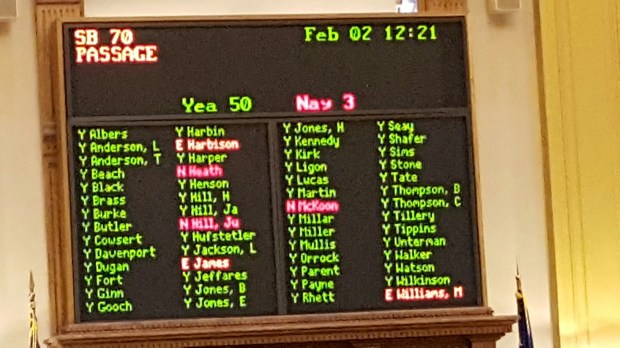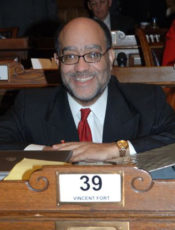The state Senate, as expected, approved the renewal of a hospital “provider fee’’ Thursday that will fill a $900 million hole in the Georgia Medicaid budget.
Though the vote was 50-3, the debate beforehand became testy. Democrats called for the state to expand its Medicaid program, as 31 other states have done. Georgia’s Republican leadership has repeatedly rejected that idea, calling it fiscally unsound.

Expansion was authorized under the 2010 Affordable Care Act. But Republicans in Washington, who now hold the presidency as well as both houses of Congress, are determined to repeal the ACA, so the future of Medicaid expansion is uncertain everywhere.
Meanwhile, the provider fee is a way to help fund the Medicaid program by drawing extra federal funding to the state.
Despite its detractors’ use of the term “bed tax,’’ the fee currently is not levied on individual patients or on hospital beds, but is based on hospital patient revenue.

The currently approved provider fee raises money from hospitals, and the funds are then returned to the hospitals through reimbursements. Individual hospitals are reimbursed differing amounts, based on how much Medicaid business they do.
Under the formula, the “winners” are the hospitals that get back more money than they paid through the levy, while the “losers” are those that get back less. The state collects about $310 million from hospitals, which is then matched with $600 million in federal funds.
The debate Thursday included an attempt by Sen. Josh McKoon (R-Columbus) to shorten the period of time for the provider fee renewal to one year, from three years as stated in the legislation.
“If we pass Senate Bill 70, the way it’s written, we’re giving away our authority for three years. I don’t like writing a blank check to bureaucrats,” McKoon told his Senate colleagues.

He noted that with Donald Trump now president, Medicaid may be moving to a block grant structure. That would transform the program, which serves low-income people and the disabled.
McKoon listed the Georgia hospitals that lose money under their current provider fee payments. They include hospitals connected to HCA, Emory, WellStar, Piedmont, and Northside.
Senate Majority Leader Bill Cowsert (R-Athens) argued for the three-year time frame, saying that if the federal program changes, the Department of Community Health will cease the collections anyway. “It’s unnecessary to shorten the period of time,’’ he said.
McKoon’s amendment was easily defeated.

Democrats followed with their drive to cover more uninsured Georgians through Medicaid expansion. Sen. Vincent Fort (D-Atlanta) said expanding the state’s Medicaid program would provide health insurance to 500,000 Georgians who currently are uninsured.
“This is a moral issue as well as an economic issue,’’ Fort said, adding that Medicaid expansion would attract many more federal dollars than the provider fee. It would help rural hospitals as well as urban facilities, he said, adding that it would generate billions in new revenue and thousands of jobs.
Republicans responded that it was not an appropriate time to discuss expansion.
Sen. Renee Unterman (R-Buford) said the provider fee is an issue “too important for politicization.” Safety-net hospitals are at risk of losing the money they would get from it, Unterman added.
Senate Minority Leader Steve Henson (D-Stone Mountain) said Georgia hospitals “have been rocked’’ by the state’s refusal to expand Medicaid. “Many hospitals in Georgia are barely surviving,” he said.

Medicaid, jointly financed by the federal government and individual state governments, covers almost 2 million poor and disabled Georgians.
Senate Bill 70 now heads to the Georgia House, where it’s expected to be approved easily.,

